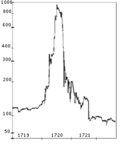The Business and Economics Portal  Business is the practice of making one's living or making money by producing or buying and selling products (such as goods and services). It is also "any activity or enterprise entered into for profit." A business entity is not necessarily separate from the owner and the creditors can hold the owner liable for debts the business has acquired. The taxation system for businesses is different from that of the corporates. A business structure does not allow for corporate tax rates. The proprietor is personally taxed on all income from the business. A distinction is made in law and public offices between the term business and a company such as a corporation or cooperative. Colloquially, the terms are used interchangeably. (Full article...) Economics (/ˌɛkəˈnɒmɪks, ˌiːkə-/) is a social science that studies the production, distribution, and consumption of goods and services. Economics focuses on the behaviour and interactions of economic agents and how economies work. Microeconomics analyses what is viewed as basic elements within economies, including individual agents and markets, their interactions, and the outcomes of interactions. Individual agents may include, for example, households, firms, buyers, and sellers. Macroeconomics analyses economies as systems where production, distribution, consumption, savings, and investment expenditure interact; and the factors of production affecting them, such as: labour, capital, land, and enterprise, inflation, economic growth, and public policies that impact these elements. It also seeks to analyse and describe the global economy. (Full article...) Selected articleThe FairTax is a proposal to reform the federal tax code of the United States. It would replace all federal income taxes (including the alternative minimum tax, corporate income taxes, and capital gains taxes), payroll taxes (including Social Security and Medicare taxes), gift taxes, and estate taxes with a single broad national consumption tax on retail sales. The Fair Tax Act would apply a tax, once, at the point of purchase on all new goods and services for personal consumption. The proposal also calls for a monthly payment to all family households of lawful U.S. residents as an advance rebate, or "prebate", of tax on purchases up to the poverty level. Selected image
Selected economyThe economy of Hong Kong is a highly developed free-market economy. It is characterised by low taxation, almost free port trade and a well-established international financial market. Its currency, called the Hong Kong dollar, is legally issued by three major international commercial banks, and is pegged to the US dollar. Interest rates are determined by the individual banks in Hong Kong to ensure that they are market driven. There is no officially recognised central banking system, although the Hong Kong Monetary Authority functions as a financial regulatory authority. Its economy is governed under positive non-interventionism, and is highly dependent on international trade and finance. For this reason it is regarded as among the most favorable places to start a company. In fact, a recent study shows that Hong Kong has come from 998 registered start-ups in 2014 to over 2800 in 2018, with eCommerce (22%), Fintech (12%), Software (12%) and Advertising (11%) companies comprising the majority. The Economic Freedom of the World Index lists Hong Kong as the freest economy, with a score of 8.58 based on data from 2022. (Full article...) Selected quote"Condit's successors once again emphasized civil aviation. The 777 is a success, and the Dreamliner appears a better vehicle for the future than the huge Airbus 380. By 2008, Boeing had regained from Airbus its leading position in commercial aviation and the share price its earlier value. At Boeing, as at ICI, shareholder value was most effectively created when sought obliquely. That profit-seeking paradox, like the conundrum of happiness, illustrates the power of obliquity. Comparisons of the same companies over time are echoed in contrasts between different companies in the same industries. Jim Collins and Jerry Porras undertook paired comparisons between outstanding ('visionary') companies and adequate, but less remarkable firms with similar operations. Merck and Pfizer was one such comparison. Collins and Porras compared oblique philosophy of George Merck-'We try never to forget that medicine is for the people. It is not for the profits. The profits follow, and if we have remembered that, they have never failed to appear. The better we have remembered it, the larger they have been'-with the directness of John McKeen of Pfizer-'So far as humanly possible, we aim to get profit out of everything we do'." TopicsRelated WikiProjectsDid you know (auto-generated) -
On this day in business history
General imagesThe following are images from various business-related articles on Wikipedia.
More did you know
Business news
SubcategoriesRelated portals
Things you can doUrgent and important articles are bold
WikimediaThe following Wikimedia Foundation sister projects provide more on this subject:
SourcesDiscover Wikipedia using portals |

















































